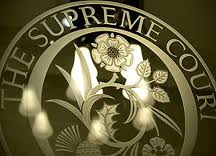The BBC's "Justice Makers" is a fascinating and unique insight into the Supreme Court of the U.K. There is much to be commended in the programme in which four of the court's Justices (Lords Phillips, Hope, Kerr and Lady Hale) take a central part. It is essential viewing whether the viewer is a lawyer or not!
Their backgrounds and personalities of the four justices are revealed. How the court makes its decisions is examined and several of the recent high profile cases are discussed including the M.P.s accused of making false claims; bank charges on overdrafts; pre-nuptial agreements and control orders. There are several rather personal touches as well. Lady Hale (the only female justice) hoped that the others would "forgive" her for disagreeing with them about pre-nuptial agreements. Lord Kerr admired the "nimble footedness of counsel" as they change tack during argument before the court. Lord Hope likes to go home to write his judgments since it is more peaceful there than the hurly-burly of London. At the end of the programme there is a feeling that we are more than fortunate to have this court which is clearly committed to maintaining the rule of law with cases decided by independently-minded people.
BBC Four - "The Highest Court in the Land: Justice Makers" - "They are the UK's most powerful arbiters of justice and now, for the first time, four of the Justices of the Supreme Court talk frankly and openly about the nature of justice and how they make their decisions. The film offers a revealing glimpse of the human characters behind the judgments and explores why the Supreme Court and its members are fundamental to our democracy."
Addendum: The BBC programme may only be viewed up to 6th February.
For a much more detailed analysis of the programme see Lallands Peat Worrier.
This blog does not offer legal advice and should never be used as a substitute for professional legal advice. Posts are not usually updated.
Subscribe to:
Post Comments (Atom)
-
See also Later post 5 July - Tommy Robinson Appeal - Observations A common saying is "A lie can travel halfway around the world bef...
-
Update 21st April 2014: The defence discussed in this post is to be abolished from 13th May 2014 though the abolition is not retrospectiv...
-
Procuring miscarriage is a criminal offence which carries a maximum punishment of life imprisonment. The Offences against the Person Act ...
Parliament - who is the Official Opposition
At the time of writing, His Majesty's Official Opposition is the Conservative Party. According to Erskine May - 'There are oppos...





I'm a law student and watched it found it a fascinating insight and informative even from the legal perspective.
ReplyDelete@ Hayley - yes, it was legally interesting. They emphasised that they are not political appointees (c.f. USA Supreme Court). Ability to analyse, do not rush to judgment, keeping one's mind open to argument, independence of thought. Those were the "required" characteristics for appointment.
ReplyDeleteThey described well how they go about reaching their decisions: reading, oral argument (including robust but, at times good humoured, debate with counsel, collegiate-style discussion, a lead judgment which is sent to the others. Dissenting judgments also discussed: how they can be proven to be "right" and how in the most important cases they sit with 7 or 9.
It was interesting to hear their personal perspectives on some of the cases. Lord Phillips would have loved to have the OFT investigate charges on overdrafts but it was not in the OFT's remit. Lady Hale's view that "pre-nups" work against equality. The unanimity among former Law Lords and the Supreme Court justices about the undesirability of control orders and their view (expressed well by Lord Hope) that the executive may not like certain decisions but they respect them. (At times I not quite so convinced of this). Above all, the executive must not have unbridled power.
Altogether a well produced and thoughtful programme. I hope you encourage your friends to watch it. Good luck for the future and thanks for your comment.